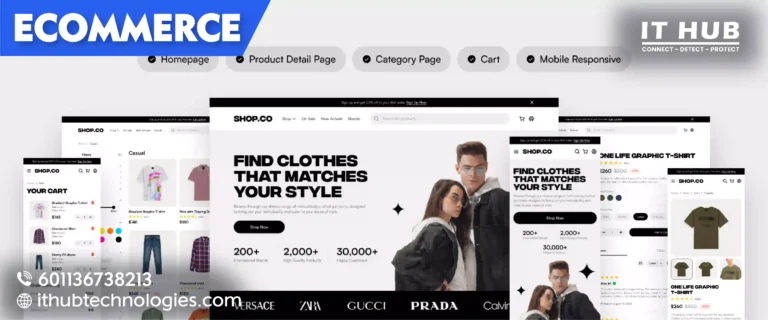

Look around you. We live in a digital era where almost everyone is glued to their phone screens. Along with everything else, businesses have also changed the way they work. Online retailers deal in an entirely different manner. Trade ain’t what it used to be. Now, there’s e-commerce. It’s changed everything. On the Internet, we trade goods and services. Today being an online retailer isn’t much of a problem. You just need to partner with IT Hub Technology in Malaysia. The article below with provide you details on ways to start your benefits of online business and how to start your business in Malaysia.
It’s buying and selling online. It knows no distance. It’s global. It comes in different flavors. B2B involves manufacturers, wholesalers, and retailers. B2C? Think Amazon or Flipkart. But, e-commerce also includes C2C and C2B. E-commerce pros? Plenty! It’s like a global shop. No more limits.
Plus, lower costs, and higher profits. Open 24/7, fast deliveries, direct chats – customers love it. Start with e-commerce? Plan first.
Get the right platform, and create an easy-to-use website. Put in secure payment and shipping methods. Understand your market. Choose your products smartly. Market your brands cleverly.
Let us learn in detail about what is the advantages and disadvantages of E-commerce and its types.

A Brief Overview There are four main groups of electronic commerce, based around who’s involved in the deals. These include:
1. Business to Business (B2B):
It’s exactly how it sounds – companies doing deals with other companies, leaving the final customer out. A manufacturer dealing with an online retailer like Alibaba, ThomasNet, and Global Sources. However, the process can be complex so an expert like IT Hub Technology can help you if you have an ecommerce storefront.
2. Business to Consumer:
Companies sell their products or services directly to you, the customer. You can scan their site, check out products, look at photos, read reviews, and make a purchase. An online retailer can directly send it right to you. Think Amazon, Flipkart, Jabong!
3. Consumer to Consumer, or C2C:
It’s just consumers making deals with other consumers – no company needed. It’s great when people want to offload personal items like cars or electronics. Try out OLX, Quikr!
4. Consumer to Business, or C2B:
It’s B2C flipped. Customers offer goods or services to companies. Like an IT freelancer who mixes up and sells a specialized software right to a business.
5- Mobile Commerce:
MCommerce is about making purchases via mobile devices like smartphones or tablets. This allows anyone to do things like shop or pay bills through mobile apps or websites designed for mobile. Mobile apps from Amazon, eBay, and PayPal, along with several mobile banking apps, are examples of m-Commerce.
Some benefits of online business are:
1. Global Reach: Sellers or online retailers can connect with customers worldwide using e-commerce. You just need to learn how to start an online business in Malaysia or connect with IT Hub Technology.
2. Lower Costs: It’s good to invest in your e-commerce storefront as it helps cut costs including rent and staffing, thus meaning more profit.
3. Convenience: E-commerce allows customers to shop anytime, anywhere. At the same time, businesses can operate 24/7.
4. Direct Interaction: E-commerce makes it easy for businesses to talk directly to customers. This helps build strong relationships.
5. Quick Delivery: E-commerce allows fast delivery, promoting customer satisfaction
1. Start-up Expense: Starting an e-commerce site can be expensive, with costs for things like hardware and employee training. This can put it out of reach for smaller businesses. The e-commerce storefront can be expensive and time-consuming.
2. Risk of Failure: E-commerce is a competitive market where many new businesses don’t make it. However, the best business strategies and other factors have a role to play in the success and failure of your company.
3. Lack of Personal Interaction: E-commerce experiences can feel impersonal compared to in-person shopping.
4. Security Risks: E-commerce transactions can be a target for data thefts and fraud. This threatens customer trust. Online retailers need to be careful when making transactions as it is the customer’s sensitive information at a cost.
5. Delivery Complications: Issues with things like shipping delays and returns can hurt an e-commerce business’s reputation.
E-commerce links people who want to know how to start their online business in Malaysia. Think of it as an online shop—customers drop by your online store, look over your items, and buy something. But, online retailers also come with a back-and-forth chat between your site and the server hosting it.
Generally, e-commerce takes these steps:

For success in e-commerce, IT Hub Technology in Malaysia offers high-tech solutions. With cutting-edge tech and skilled professionals, they help businesses make the most of e-commerce. The advantages of online business can be assured if you work on your e-commerce storefront with our team at IT Hub Technology.
E-commerce is changing how global commerce works. It offers businesses many benefits like reaching more customers and cutting costs. By using e-commerce and seeking help from experts like IT Hub Technology in Malaysia, businesses can find new paths to success online. Connect with us right away!